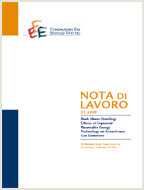Fairness, Credibility and Effectiveness in the Copenhagen Accord: An Economic Assessment

13.02.2010
Enrica De Cian, Alice Favero
Q54,Q56, Q43
International Climate Policy Architecture, Integrated Assessment Model, Post-Kyoto
Climate Change and Sustainable Development
Carlo Carraro
State-of-the-art literature on climate change policies has proposed numerous approaches for the Post-Kyoto agreement. However, in analysing the outcome of negotiations, the feeling is that a huge gap exists between policy makers and scientists. This paper tries to bridge this gap by providing a critical and comparative analysis of the Copenhagen Accord provisions, linking them to a part of the climate-economy literature. It assesses Copenhagen outcome in terms of economic efficiency, environmental effectiveness and political credibility. Our conclusion suggests that the Copenhagen Accord succeeded in considering some of the climate policy principles, namely credibility, equity and fairness. First, the change in political leadership indicates a more collaborative mood. Regarding equity and fairness, developing countries obtained an explicit commitment by developed countries for technology, but especially financial transfers, though on a conditional basis. The major limitation of the Accord is the way it addresses the trade-off between politically viability, thus implicitly fairness, and economic and environmental effectiveness. Therefore, future negotiations should deal with the eventuality of a global temperature increase above the 2 degrees, even in the presence of successful global mitigation.
